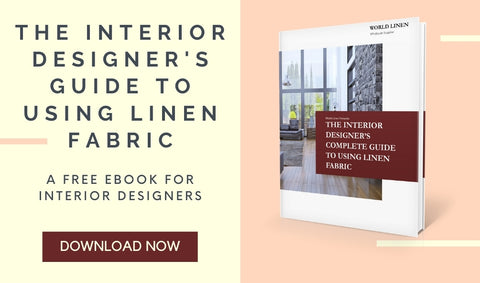If you are embarking upon a large design project that involves the timeless linen fabric, you’re likely on the hunt for bolts of material.
Costs can quickly rise when you need to buy linen fabric in large quantities, and keeping costs down can help you profit more from the time and energy you are putting into this important project.
With many retail options available to you, where is the best place to buy wholesale linen fabric by the bolt? You typically have three options available to you:
- A wholesale fabric supplier
- A fabric distributor
- A fabric retail store
Let’s dive into each of these three options, as well as some other tips to ensure you’re getting the most out of your purchase.
Wholesale Fabric Supplier
A linen fabric wholesale supplier is often the best option when cost is a concern. Distributors will mark up prices before selling the fabric to you since they act as “middle men.” When you purchase wholesale fabric from the supplier, you can get more fabric for your purchase price.
Suppliers often have unlimited options as well, making personalizing an order or choosing a fabric that reflects your client’s tastes easy.
One thing you must watch out for when working with a wholesale fabric supplier is if that business has minimum quantity requirements. Some suppliers will require that you purchase a certain amount of wholesale fabric by the bolt at minimum, but if your project is large in nature, this likely won’t be an issue.
Fabric Distributor
Wholesale fabric distributors can offer many of the same benefits as suppliers, from large quantities of fabric to customizable options. However, one of the biggest drawbacks of purchasing from a linen fabric distributor is cost.
Like we mentioned above, distributors purchase fabric from suppliers, mark up the price and then sell it to an end-user. That end-user could be you as a designer or a retail fabric store. The one advantage that distributors have is that often they do not require fabric quantity minimums. So if your project is on the smaller side, you may have no choice but to work with a distributor.
Fabric Retail Store
Your third option is to buy directly from a fabric retail store. You can do this either online or in-person. This is a great option if you’re in a pinch and need linen fabric quickly.
However, the quality of the fabric may not be as great and you likely won’t find the quantities you need, especially if you have a large project. Worse, if you need to go back for more fabric, there’s a good chance it won’t be there since retail stores only keep small quantities on hand.
Buying from a fabric retail store is also the most expensive option since they must mark up the price again after purchasing it from a distributor in order to make a profit. You, as the consumer, pay the price for that.
Stay Domestic When Ordering Wholesale Fabric Online
When ordering wholesale fabric online, your options are endless. Wholesale fabric suppliers around the world may be able to offer the fabric you want, but the process of actually getting that fabric in your hands may take longer than you anticipate.

Choosing a domestic supplier will often provide more benefits to you than working with one overseas. Issues you may face when working with an international supplier include:
- Difficulty communicating through different time zones
- Longer shipping times due to greater distances
- Potential delays at customs once your product hits the U.S. border
- Fewer buyer protections in place if an order is not fulfilled correctly
- Difficulty communicating with customer service representatives overseas
While purchasing wholesale fabric online from an international company may be completely safe, it may simply present headaches that could prolong the timeline of your project.
Other Tips For Buying Wholesale Linen Fabric By The Bolt
Now that you’ve decided who you want to buy your wholesale linen fabric from, here are some additional tips that can help you narrow down the best fabric partner to work with as you move forward with your project.
Look For A Supplier That Customizes
Whether you’re ordering a small piece of fabric or an entire bolt of fabric, you should have the option of customizing your order. The best wholesale linen suppliers will offer you the opportunity to customize color and prints.
With color in particular, it’s important to have your own custom dye lot created to help ensure the fabric you choose is the color you want. Much greater stringent controls are added so that the mill can meet specifications. The results are repeatable and reliable with a maximum variation of 3% to 5%.
What you should NEVER do is rely on the manufacturer’s website for color. Instead, request a fabric swatch, which will give you a better idea of what to expect with your customized color since color shifts can happen with “stock” colors.
Some linen fabric suppliers will offer rotary/flat bed printing and digital printing to offer you print customizations.
Rotary/flat bed printing is a direct-to-fabric printing technique where the image is engraved on precision cut stencils, also known as screens. Multiple screens can be used to create a multi-color design and can produce vivid colors and intricate designs on your fabric. Crisp lines and detailed images are created using screen printing, allowing inks to penetrate the fabric and hold color better and longer.
Digital printing on fabric is also known as DTG, or direct-to-garment printing. Digital printing is any inkjet based method of printing colorants onto fabric. This process allows for lower minimums, eliminates screen charges and removes the need for screen storage.
Don’t Forget About Other Customizations
While you may be focusing on color and print, it’s important to not forget other customizations … some of which are legally required.
You may need to incorporate backing into the design since the slightest change in fabric weight can impact pieces like furniture upholstery fabric. Manufacturers also often add backing to help prevent seams from slipping.
Some popular types of backing include:
- Latex backing, which helps prevent soil from sifting through the fabric
- Knit backing, which can make lighter weight fabrics more durable
- Light-reflecting backing, which keep light from entering the room
If you have a commercial client like a hotel, you may need complete blackout backing, which also has noise-dampening properties.
Protective coatings like nano coatings are another customizable option. Nano coating is a very thin transparent plastic polymer film coating that helps to repel dry particles, water, oil and dirt. Scotchgard and Alta treatments also protect the fabric against dirt and spills.
Finally, incorporating fire coatings is a matter of meeting safety requirements. In California, commercial furniture projects must comply with TB117-2013, a fire rating regulation that requires that upholstery fabric pass smolder cigarette tests. Fire retardant applications are required under California law for public spaces as well.
Work With A Domestic Wholesale Fabric Supplier
When selecting a supplier, opting for a domestic company over one located overseas offers distinct advantages. This choice circumvents a range of potential challenges associated with international transactions:
- Communication hurdles and time zone disparities are minimized.
- Shipping durations are reduced.
- There's less risk of encountering delays due to customs-related issues.
- The ability to conduct regular onsite inspections to ensure adherence to manufacturing standards is enhanced.
- Should an order be mishandled, recourse options are more accessible.
Partnering with a domestic linen supplier also ensures a more direct line of communication. This accessibility fosters a sense of reliability, reassuring clients that queries will be promptly addressed and orders fulfilled punctually.
Check References
You may feel as though you’re hiring for your business by checking references, but ensuring other clients like you have had positive experiences with a wholesale linen supplier you are considering is important.
By checking references, you gain valuable insights into the supplier’s track record and reliability. Reach out to other businesses or individuals who have previously collaborated with the supplier. Inquire about the quality of the linen, the reliability of deliveries and the overall satisfaction with the supplier’s services.
These firsthand accounts can provide invaluable guidance in making an informed decision. Taking the time to verify the supplier’s reputation can ultimately save you from potential headaches and ensure a smoother procurement process.






